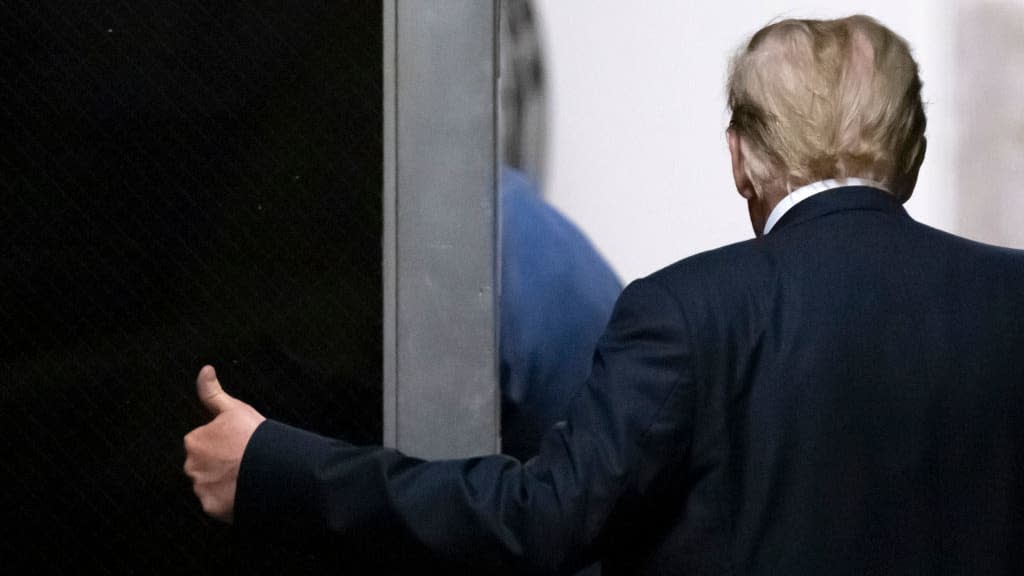Prosecutors Tell One Final Story About Trump’s Sordid Dealings

After five weeks of combing through phone logs, contracts, invoices, checks, tweets, and text messages about Donald Trump and his band of women-silencing henchmen, Manhattan prosecutors on Tuesday finally did what jurors have been waiting for: They told a story.
It was a tale of deception and intrigue, as assistant district attorney Joshua Steinglass spent hours describing exactly how his team thinks the former American president hid sexual affairs before the 2016 election by faking paperwork to cover up what they allege amounts to election interference.
By now, the jury was all too familiar with the dramatis personae: ex-Playboy Playmate Karen McDougal and porn star Stormy Daniels, who worked with publicist Gina Rodriguez, who shopped around sleazy stories with celebrity lawyer Keith Davidson, who cut dirt-disappearing deals with the likes of National Enquirer editor Dylan Howard, who answered to his Trump-loving boss David Pecker, who maintained a backchannel to Trump consigliere Michael Cohen, who’d call Trump bodyguard Keith Schiller to reach the man at the top.
Steinglass sped through the descriptions as text messages and phone calls flashed on the four courtroom screens: “Pecker to Howard, Howard to Pecker, Pecker to Cohen, Howard to Pecker.”
The communications were no longer disparate discussions. An interdependent web came into full view.
“Cohen to Pecker. Cohen to Trump. And Cohen tells him, among other things, that Stormy Daniels is back,” Steinglass told jurors.
Robert De Niro Argues With MAGA Hecklers About Jan. 6 Outside Trump Trial
With the logs now in chronological order, jurors could see how mere minutes would tick by between pings, as deals were negotiated in the weeks before the 2016 election.
“Ten minutes later Cohen calls Trump to update him… Cohen testified that he left a voicemail. The next morning, Melania Trump texts Cohen to call Trump at his cell,” Steinglass said.
But like any Greek tragedy, the author put his hero through the wringer. In this case, it was the Manhattan District Attorney’s key witness, the Trump fixer-turned-bagman-turned-defector. By relying on Cohen—a disbarred former lawyer convicted of perjury in part for his role in the scheme—prosecutors understood the challenge in having jurors believe the one person most enraged at Trump to describe his boss’s part in the story.
Prosecutors faced it head-on.
“Michael Cohen is understandably angry that, to date, he's the only one to pay the price for his role in the conspiracy,” Steinglass said, acknowledging how the wealthy real estate and taxi medallion baron has managed to parlay his infamy into a lucrative media personality gig.
“I'm not asking you to feel bad for Michael Cohen. He made his bed. But you can hardly blame him for making money on the one thing he has left: his knowledge of the inner workings of the Trump phenomena,” Steinglass said.
But, as with any debate about the eternally divisive politics of Trump, prosecutors were simultaneously engaged in an entirely different battle: one against false equivalencies.
Sure, Cohen “misled the press, Congress, the FEC,” Steinglass conceded, addressing the Trump team's legal strategy’s focus. But even the slightest dash of context shows that most of Cohen’s lies were in service to Trump.
“That's kind of rich, because the lies that he told to Congress in 2017 had to do with the Mueller investigation and had to do with the Russia probe, and what Michael Cohen lied about was the dealings the defendant had in Russia,” Steinglass pointed out.
Meanwhile, prosecutors sidestepped the more lurid side of the entire affair—the blatant campaign to hit up a leading Republican presidential candidate for cold hard cash during the most vulnerable moment of his campaign.
“Think what you want about Mr. Davidson and trading on stories... maybe you think it’s a sordid practice... in the end, it doesn’t really matter, because you don’t get to commit election fraud or falsify your business records because you think you've been victimized. In other words, extortion is not a defense for falsification of business records,” Steinglass said.
From there, Steinglass continued a nearly six-hour marathon of Wagner-esque proportions. He repeatedly reviewed how the testimony of key witnesses breathed life into countless documents, gliding over several overlapping timelines that all met their nexus on election day in 2016—claiming that Trump duped the American public by keeping his hush-money deals out of the public view.
“The name of the game is concealment, and all roads lead inescapably to the man who needed it most, the defendant, former President Donald Trump,” Steinglass said.
A visibly exhausted judge interrupted Steinglass every few hours to ask for short breaks, and repeatedly inquired when prosecutors planned to wrap up.
And yet, he persisted.
In the closing hour, Steinglass made a reference to not wanting to beat a dead horse—which elicited laughter across the courtroom. He responded by saying that the reference wasn’t meant to be a joke, prompting security to order journalists in the chamber to quiet down.
In the final stretch, Steinglass told jurors to act bravely and use common sense.
“You, the jury, have the ability to hold the defendant accountable,” he said. “Just like any other case, [Trump] can be judged by his peers.
“You have to put aside the distractions, the press, the politics, the noise, and focus on the evidence and the logical inferences that can be drawn from that evidence,” Steinglass added.
Get the Daily Beast's biggest scoops and scandals delivered right to your inbox. Sign up now.
Stay informed and gain unlimited access to the Daily Beast's unmatched reporting. Subscribe now.


